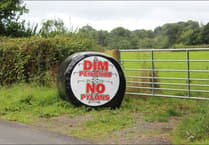HEALTHCARE facilities burn, food and water supplies for desperate people are blocked and drones shoot their fleeing targets.
It has been outrage over the unrelenting slaughter of Palestinians in Gaza that has impelled Ireland to back South Africa’s genocide case against Israel at the International Court of Justice.
The Welsh Government should now not hesitate to align itself with the court action, recognising that this is an issue so horrifying that some people have stopped watching or listening to the news because the vast-scale blood-letting and flattening of homes, hospitals, schools and public infrastructure in Gaza - and, more lately, civilian deaths in Lebanon - have become too appalling to witness, even remotely.
A Dáil Éireann motion agreed that “genocide is being perpetrated before our eyes by Israel in Gaza”, while in proceedings begun last December, S Africa argues the war in Gaza has breached the 1948 United Nations Genocide Convention, an accusation Israel strongly denies.
Spain, Bolivia, Colombia, Mexico, Turkey, Chile and Libya have already sided with S Africa.
In the immediate term, because intervention with the court can take months, the government or, better, a united Senedd, should act decisively by vigorously urging the Biden administration, in the last two months of its reign, to stop further Palestinian - and Lebanese - deaths by quickly halting exports of the weaponry and munitions that enable the killing.
There may not be much hope of success for such an initiative, yet the Senedd must surely unite in agreeing that the persisting facilitation of unceasing death and destruction is deeply disturbing.
It will also presumably be discouraged that the Biden administration has more or less ignored a US deadline for Israel to increase the tiny amount of humanitarian aid it allows into Gaza, having said a month ago that it could suspend American military support to Israel if conditions didn’t improve.
Yet, in the face of carnage, Wales cannot be a silent bystander.
It's feeding time at the trough
HAPPY days for county councillors in Ceredigion, Gwynedd and Powys.
Crucial public services starved of cash may be increasingly going to the dogs, but the quangoists deciding on councillor pay know a spending priority when they see one.
The unbeautifully named Independent Remuneration Panel for Wales (IRPW) has said councillors are due a £1,100 increase. That’s a 5.9 per cent leap, or slightly more than two-and-quarter times the inflation rate, and will take pay, from next March, to £19,771.
That’s just the figure for the minions, and it’s an award entirely without reasoned justification.
Ceredigion council leader Bryan Davies, on the other hand, will pocket £63,020, up £3,398; deputy leader Alun Williams is being lobbed almost £2,500 extra, to a new £44,114.
Leaders of Gwynedd and Powys councils - bigger authorities - will rake in £66,727, and deputy leaders £46,709.
One question now is whether any of these purportedly solid and responsible regional politicians will ask themselves whether, with schools threatened with closure and residential care homes closing, they will be assailed by bad consciences if they take the money, considering the misery of constituents whose lives may have been seriously disrupted - in some cases turned inside out - by the severity of local government spending cuts.
But this is only part of the story, because the panel also makes clear that councillors are perfectly free to forgo all or part of their salary, including, therefore, the freedom to decide not to accept pay rises.
They say: “If an individual does not need payment, or does not wish to receive all or some of their entitlement, they can stop or reduce payment. This is a personal, individual decision…”
Fundamentally, however, these pay rises are insupportable - ethically or in terms of reasoned argument.
Moral dilemmas are personal tests, so broad-brush verdicts are not possible.
But the public can rightfully get involved over the IRPW’s claim that it has set the basic salaries of councillors “to closer align with the average earnings in Wales.”
What they mean by this is as clear as a fog-blanketed dawn in the Rheidol Valley.
Are they talking about their wish to see councillor pay about the same as five-day average earnings amongst the general population? Or do they want councillors to be paid the same as people in the outside world, but on a pro-rata basis?
The distinction is crucial, but is neither acknowledged nor calculated by the IRPW.
The likelihood is that most councillors usually put in no more than the equivalent of about two full working days a week, and quite often a lot less that that.
Do these arbiters of pay want councillors to get five days’ pay for working two days or fewer? Or not.
Why can’t they be clear?
The fact is that, for most councillors, the job’s a doddle. There is no contractual obligation on numbers of hours to be worked, so councillors decide for themselves how much - or how little - time they put in for their £19,700-odd.
The Welsh Local Government Association - a kind of mouthpiece for councils - “estimates” that, “on average”, councillors spend the equivalent of three days a week on council business. The likelihood is that it won’t be anything like that much.
Based on the WLGA’s probably over-generous guess of a three-day working week, and regardless of whatever it is the IRPW means, councillors will from next year be getting the full-time equivalent of more than £32,900 a year, which happens to be very close to Welsh average weekly earnings. IRPW may conclude they can pack up and go home.





Comments
This article has no comments yet. Be the first to leave a comment.